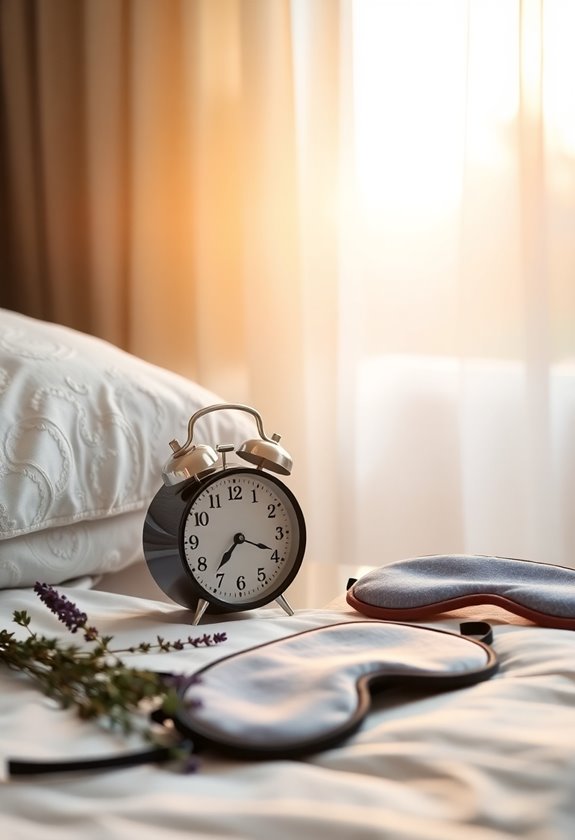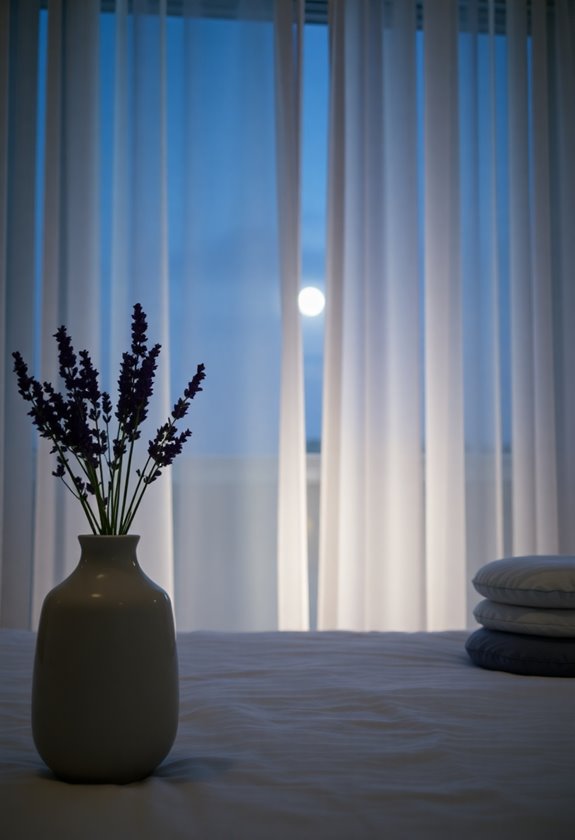You'll reset your circadian rhythm effectively by aligning daily habits with your body's natural clock. Start by establishing consistent sleep and wake times, even on weekends, and expose yourself to bright morning sunlight within an hour of waking. Schedule exercise between 7 a.m. and 4 p.m., and maintain an ideal sleep environment at 65°F with blackout curtains. Time your meals within an 8-12 hour window during daylight, finishing dinner at least 3 hours before bed. While these core strategies form a solid foundation, understanding the complete approach will help you fine-tune your biological clock.
Highlights
- Establish a consistent sleep and wake schedule, even on weekends, to help your body maintain its natural rhythm.
- Get bright sunlight exposure within 30 minutes of waking to signal your body's natural wake-up response.
- Exercise regularly at optimal times (morning or early afternoon) to reinforce your body's circadian patterns.
- Create an ideal sleep environment with a cool temperature, darkness, and minimal noise disruption.
- Time your meals within a consistent 8-12 hour window during daylight hours to align with your body's metabolic rhythm.
Creating a Consistent Sleep Schedule

Sleep schedules serve as the cornerstone of a healthy circadian rhythm. You'll need to establish both consistent bedtimes and wake times that align with your body's natural day-night cycles, which helps regulate your internal clock more effectively. Creating this schedule isn't just about choosing times—it's about making a commitment to maintaining them consistently. Research shows that maintaining regular sleep patterns is associated with 30% lower mortality rates.
To reset your rhythm successfully:
- Choose a realistic bedtime that allows for 7-9 hours of sleep
- Set your wake time and stick to it, even on weekends
- Make gradual adjustments in 15-minute increments
- Create a calming bedtime routine
- Use alarms for both bedtime and wake time
Harness the Power of Sunlight

Through the power of sunlight, you can effectively reset and maintain your circadian rhythm. When you expose yourself to morning sunlight shortly after waking, you're giving your body a clear signal to start the day and regulate your sleep-wake cycle. This exposure is crucial as ipRGC cells detect these changes in daylight intensity to help synchronize your internal clock.
To maximize sunlight's benefits, step outside for at least 30 minutes during the day, preferably in the morning or early afternoon. You'll find that outdoor light is considerably more powerful than indoor lighting, providing about ten times the brightness needed for proper circadian synchronization. While you're following this routine, don't forget to gradually reduce light exposure in the evening, particularly from blue light sources like screens, as this can interfere with your body's natural sleep signals.
Time Your Exercise Right

Exercise timing plays an essential role in resetting your circadian rhythm and maximizing your fitness goals. For the best sleep-wake cycle regulation, you'll want to exercise either at 7 a.m. or between 1 p.m. and 4 p.m., which helps advance your body clock naturally. Recent studies from Arizona State University researchers have confirmed these optimal exercise windows.
- Morning workouts (especially within two hours of sunrise) will boost your mood, improve sleep quality, and take advantage of naturally higher testosterone levels for muscle building.
- Late afternoon sessions (2 p.m. – 6 p.m.) are ideal for peak performance, as your body temperature, strength, and lung function are at their highest.
- Whatever time you choose, stick to it consistently to reinforce your internal clock and improve your overall circadian rhythm.
Optimize Your Sleep Environment

While timing your workouts sets a strong foundation for your circadian rhythm, creating the right sleep environment amplifies these benefits considerably. You'll want to maintain your bedroom at around 65°F (18°C), which research shows is ideal for quality sleep throughout the night. The master biological clock in your brain responds best to consistent environmental cues that signal bedtime.
Transform your bedroom into a sleep sanctuary by installing blackout curtains to block unwanted light, and consider using a white noise machine to mask disruptive sounds that might interrupt your rest. Choosing light-blocking drapes can eliminate up to 99% of external light that disrupts sleep quality. It's crucial to remove electronic devices and work-related items from your sleeping space, as these can trigger stress responses and make it harder to wind down. For the best results, you should maintain consistent room conditions every night, which helps your body recognize when it's time to sleep.
Master Your Meal Timing

Your body's internal clock responds powerfully to eating patterns, making meal timing an essential factor in regulating your circadian rhythm. You'll want to establish consistent eating times that align with daylight hours to maintain ideal metabolic health and energy levels throughout the day. Research shows that irregular eating schedules can disrupt natural metabolic processes and contribute to weight gain.
To reset your internal clock through meal timing:
- Schedule your meals within an 8-12 hour window during daylight hours
- Eat breakfast at the same time daily to synchronize your rhythms
- Complete your last meal at least 3 hours before bedtime
- Wait an hour after waking before having your first meal
Following these guidelines helps support your body's natural repair processes during overnight fasting, while promoting better blood sugar control and weight management through proper circadian alignment.
Manage Light Exposure

Light exposure plays a central role in regulating your circadian rhythm, even more importantly than meal timing. Your body's internal clock responds powerfully to morning sunlight, which can shift your sleep cycle up to an hour earlier each day when you get at least 10 minutes of exposure.
During the day, you'll want to maximize your exposure to natural sunlight, as it's considerably more effective than indoor lighting for synchronizing your body clock. Even 30 minutes of outdoor light can make a difference in regulating your sleep-wake cycle. In the evening, you’ll need to be strategic about light exposure, as bright light can delay your sleep timing by up to two hours. To support healthy sleep patterns, dim your indoor lights and avoid blue light from screens in the hours before bedtime.
Track and Adjust Your Rhythm

Successfully tracking and resetting your circadian rhythm requires consistent monitoring and strategic adjustments to your daily routines. You'll need to maintain a regular sleep schedule by going to bed and waking up at the same time every day, even on weekends, as this helps your body establish predictable patterns.
Use technology to your advantage by monitoring your heart rate data through smartwatches and apps, which can provide valuable insights into your circadian patterns. Additionally, you'll want to make strategic lifestyle adjustments, including timing your exercise sessions earlier in the day and maintaining consistent meal schedules. When you're adapting to changes, remember to adjust your sleep schedule gradually, and consider using light therapy when natural sunlight isn't available to help establish new patterns.
Frequently Asked Questions
Can Certain Medications Interfere With Resetting My Circadian Rhythm?
While you might think all medications just target specific conditions, many can actually disrupt your sleep-wake cycle. Common medications like beta blockers, corticosteroids, and certain antidepressants can interfere with your body's natural rhythm. You'll want to discuss timing with your doctor, as some drugs affect melatonin production or interact with circadian-controlled enzymes. If you're taking medications, don't adjust your schedule without medical guidance.
How Long Does Jet Lag Typically Last When Traveling Across Time Zones?
You'll typically need about one day per time zone crossed to fully adjust to your new schedule, though individual experiences can vary. When you're traveling east, jet lag symptoms often last longer and feel more severe than westward journeys. For most people crossing 1-3 time zones, you can expect symptoms to last 2-4 days, while longer trips across 6+ time zones might require 1-2 weeks for complete adjustment.
Do Genetic Factors Affect an Individual's Natural Circadian Rhythm Preferences?
Your genetic makeup greatly influences your natural sleep-wake preferences and circadian rhythm patterns. Multiple genes, including CLOCK, PER1/2, and CRY1/2, work together to regulate your internal biological clock through complex feedback loops. Research shows that variations in these genes can determine whether you're naturally a morning person or a night owl, and they'll affect how your body responds to environmental time cues.
Can Seasonal Changes Impact the Effectiveness of Circadian Rhythm Reset Methods?
Have you ever noticed how winter's darkness seems to throw your internal clock into chaos? Seasonal changes greatly impact your circadian reset efforts, as your body responds differently to light cues throughout the year. You'll need to adjust your reset methods seasonally, especially during winter when there's less natural light. Morning light exposure becomes more critical in winter months, and you'll likely need longer exposure times to achieve the same circadian-adjusting effects you'd get in summer.
Does Working Night Shifts Permanently Alter Your Natural Circadian Rhythm?
While night shift work won't permanently alter your circadian rhythm, it can cause lasting disruptions that take time to reverse. Your body's natural clock remains intact, but prolonged exposure to irregular schedules can make it harder to readjust. When you switch back to a normal schedule, you'll need several weeks to fully reset your rhythm through consistent sleep patterns and proper light exposure.




